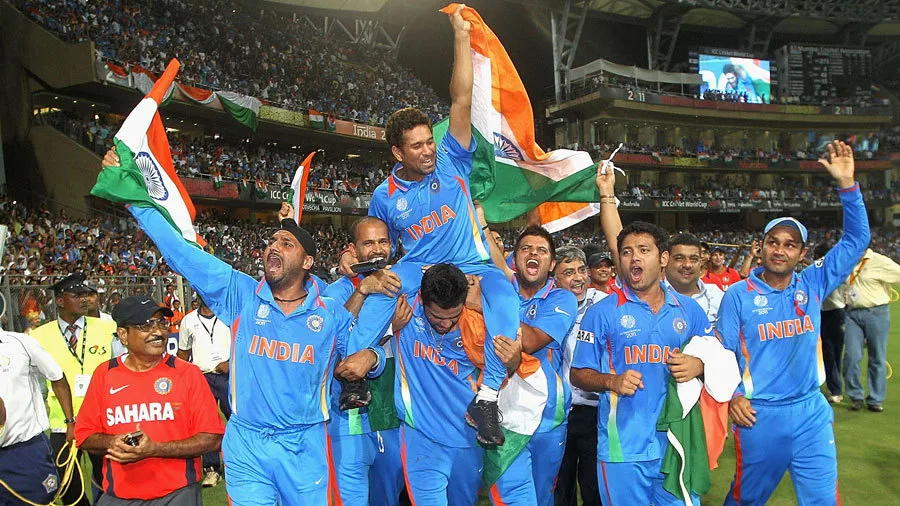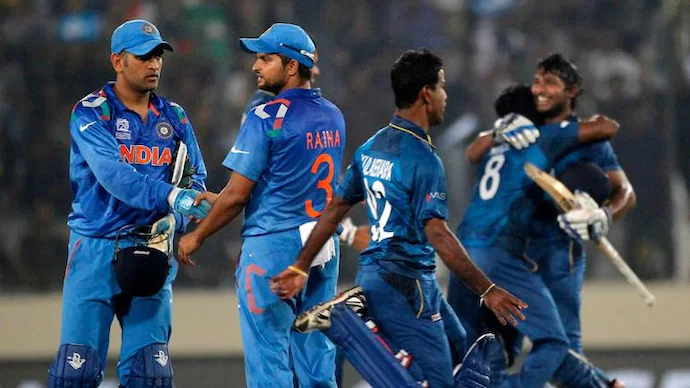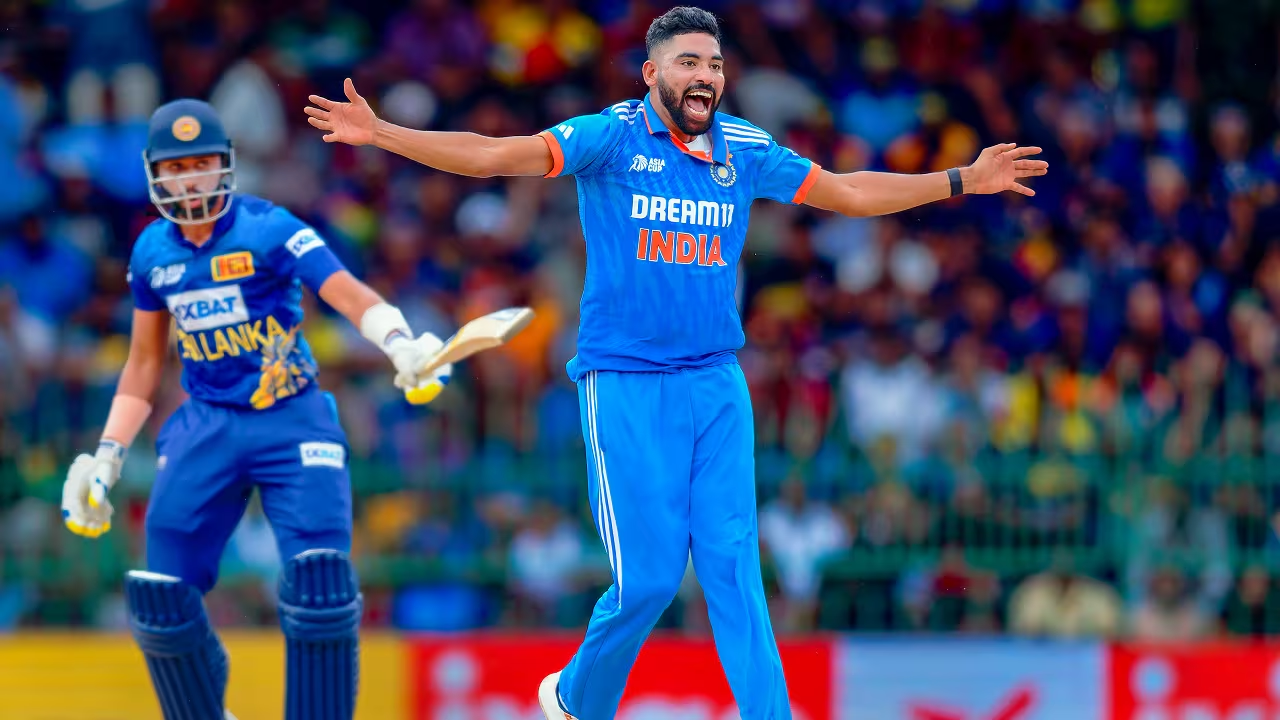India vs Sri Lanka Cricket Matches
Summary
The India vs Sri Lanka 2024 series scheduled from July 27 to August 7, includes three T20Is and three ODIs. This series is particularly significant as it marks the beginning of new leadership for both teams and serves as a crucial preparation for future tournaments. India vs Sri Lanka: T20I Series Suryakumar Yadav has been confirmed as the new T20I captain for the India national cricket team, ahead of Hardik Pandya, who served as vice-captain during India's victorious campaign in the 2024 T20 World Cup. Yadav’s first challenge as captain will be the three T20Is against the Sri Lanka national cricket team. This series is also the first assignment for India's new coach, Gautam Gambhir, as the team looks to build towards the 2026 T20 World Cup, co-hosted by India and Sri Lanka. Sri Lanka's New Leadership Sri Lanka has named Charith Asalanka as their T20I captain for the Sri Lanka national cricket team vs India national cricket team series. The squad is a blend of experienced players and young talents, aiming to pose a challenge to the visiting Indian team. Notable players include Kusal Perera, Avishka Fernando and Wanindu Hasaranga, who will play crucial roles in the series. India Tour of Sri Lanka: T20I Schedule 1st T20I: July 27, Pallekele 2nd T20I: July 28, Pallekele 3rd T20I: July 30, Pallekele India vs Sri Lanka: ODI Series The ODI series will see the return of seasoned players, with Rohit Sharma leading the India national cricket team. Shubman Gill will serve as vice-captain, and the squad also includes Virat Kohli, KL Rahul, Rishabh Pant and Shreyas Iyer. This series is vital for India as they prepare for the 2025 Champions Trophy. India Tour of Sri Lanka: ODI Schedule 1st ODI: August 2, Colombo 2nd ODI: August 4, Colombo 3rd ODI: August 7, Colombo Key Players to Watch India Suryakumar Yadav:Known for his innovative batting, Yadav’s leadership will be under the spotlight. Shubman Gill: As vice-captain, Gill’s top-order batting will be crucial for setting up b starts. Virat Kohli: His experience and form will be key in the middle order, especially in the ODI series. Sri Lanka Charith Asalanka: Leading the T20I squad, Asalanka’s performance will be critical for Sri Lanka’s success. Wanindu Hasaranga: His all-round capabilities can significantly influence the outcome of the matches. Kusal Perera: His explosive batting at the top of the order will be essential for setting the pace for Sri Lanka. The India vs Sri Lanka 2024 series will mark a new beginning with fresh leadership and strategies for both the teams. This series is expected to provide a platform for new talents to emerge. The IND vs SL series promises intense competition and high-quality cricket, also the matches will test the strategic acumen of new captains and coaching staff, setting the tone for the future of cricket in both countries.
India vs Sri Lanka Match Results
| Date | Format | Venue | India Runs | Sri Lanka Runs | Winner | Result |
|---|---|---|---|---|---|---|
| November 19, 2024 | ODI | Mumbai | 300/7 | 280/9 | India | India won by 20 runs |
| October 10, 2024 | T20I | Colombo | 150/6 | 154/5 | Sri Lanka | Sri Lanka won by 5 wickets |
Related News

India vs Sri Lanka 2011 World Cup Final: A Historic Victory That Shaped Cricketing Legacy
The India vs Sri Lanka final match of the 2011 ICC Cricket World Cup remains one of the most iconic moments in the history of Indian cricket. On April 2, 2011, the stage was set at the Wankhede Stadium in Mumbai, where India faced Sri Lanka for the coveted World Cup title. This match not only marked the culmination of the month-long tournament but also fulfilled a nation’s dream, as India lifted the World Cup after 28 years, making this a moment to cherish forever in cricketing history.
A Thrilling Encounter Under Pressure
Sri Lanka, having won the toss, chose to bat first, putting up a challenging target of 275 runs. The innings was led by their veteran opener, Kumar Sangakkara, who top-scored with a composed 48 runs. Alongside him, Mahela Jayawardene played a brilliant knock, scoring an unbeaten 103 runs off 88 balls. Jayawardene’s innings was the standout performance, showcasing his class and composure under pressure. Sri Lanka's total of 274/6 was a competitive total, but the Indian bowlers, led by Zaheer Khan, fought back well in the latter stages of the innings.
India’s chase of 275 was not going to be easy. The pressure of a World Cup final, the expectations of a billion people, and the weight of history made the task monumental. The Indian top order, which had been in exceptional form throughout the tournament, faced early setbacks. Virender Sehwag was dismissed for a quick 4 runs, and Sachin Tendulkar, the iconic figure who had dreamed of this moment his entire career, was out for just 18 runs. This set the stage for a thrilling chase, with the onus now on the remaining Indian batsmen to steer the team toward victory.
The Masterstroke of Gautam Gambhir
Enter Gautam Gambhir, who played an innings of great character. With the required rate climbing and wickets falling, Gambhir anchored the chase with a gritty 97-run knock. He combined solid technique with smart placement, ensuring that the pressure never got the better of him. His partnership with Virat Kohli, who contributed a crucial 35 runs, kept India’s hopes alive.
But it was the final charge led by MS Dhoni that turned the game in India’s favor. When India needed 53 runs from the last 6 overs, Dhoni took charge. Known for his calm demeanor in high-pressure situations, Dhoni exhibited his trademark finishing ability. With his confident batting, he guided India toward the target, bringing the World Cup to India with a six over long-on off Nuwan Kulasekara. His match-winning 91* off 79 balls made him the hero of the final.
The Unforgettable Moment
As Dhoni hit that unforgettable six, the entire stadium erupted in joyous celebration. India had won the ICC Cricket World Cup 2011, and the victory was sealed with a historic 6-wicket win over Sri Lanka. It was not just a cricketing triumph; it was the culmination of years of hard work, sacrifice, and passion for the game.
MS Dhoni’s Leadership and Impact
Under the leadership of MS Dhoni, India had triumphed not only as a team but also as a cricketing powerhouse. Dhoni’s calmness and astute decisions during the World Cup were a key factor in India’s success. He had led his team with confidence, especially during the tense moments of the final, where his match-winning knock became the defining moment of the match.
The Emotional Impact on India’s Fans
The 2011 World Cup victory sparked a nationwide celebration. From the streets of Mumbai to the rural corners of India, millions of cricket lovers witnessed the dream come true. For many, this victory was not just about winning a tournament but fulfilling a long-cherished desire of watching their country lift the prestigious trophy once again after 1983. The historic win rejuvenated the spirit of cricket in the country and further solidified India's love for the sport.
A World Cup That Changed Indian Cricket Forever
The 2011 ICC Cricket World Cup final was more than just a sporting event; it was an event that united the country and transcended beyond cricket. India’s victory was a testament to the growing strength of Indian cricket, the emergence of new stars, and the depth of talent in the country. This World Cup win also laid the foundation for India to become a dominant force in world cricket in the years that followed.
Conclusion: A Legacy that Lives On
The 2011 ICC World Cup final between India and Sri Lanka is a story of triumph, emotions, and unforgettable memories. It is a moment etched in the hearts of millions of cricket fans, with the players from both sides contributing to an unforgettable spectacle. India’s 2011 World Cup victory marked the beginning of a new era in Indian cricket, forever remembered as the time when the country’s cricketing dream was finally realized.

Sri Lanka Clinches Victory Over India in 2014 ICC T20 World Cup Final: A Historic Triumph
The 2014 ICC T20 World Cup final between India and Sri Lanka was one for the history books, as Sri Lanka emerged victorious by 6 wickets to claim their first-ever T20 World Cup title. Held at the Sher-e-Bangla National Cricket Stadium in Mirpur, Dhaka, the match was a thrilling contest that saw Sri Lanka’s calm and composed approach overpower India's attacking game.
Sri Lanka’s Historic Win in the 2014 T20 World Cup Final
Sri Lanka, led by captain Angelo Mathews, won the toss and chose to bowl first, a decision that would prove to be the right one on the day. India, under the leadership of MS Dhoni, were eager to defend their 2007 title, but Sri Lanka’s disciplined bowling attack and excellent fielding put them in control early.
India’s Innings:
India got off to a decent start with openers Shikhar Dhawan and Rohit Sharma, but Sri Lanka's bowlers, particularly Lasith Malinga, kept a tight lid on the scoring. Rohit Sharma (6) and Shikhar Dhawan (11) were dismissed early, leaving India at 16/2 in the 4th over.
At this point, Virat Kohli took the responsibility upon himself and played a brilliant knock to stabilize India’s innings. He played with maturity and showed great shot selection, scoring 77 runs off 58 balls. His partnership with Suresh Raina (10 runs off 12 balls) brought some stability to the Indian innings, but they still struggled to get the momentum they desired.
Yuvraj Singh was dismissed cheaply for 11, and it was only thanks to the late surge from MS Dhoni (10 runs off 6 balls) and Ravindra Jadeja (12 runs off 7 balls) that India managed to post a total of 130/4 in 20 overs.
Sri Lanka’s bowlers were clinical, with Lasith Malinga being the standout performer, taking 2 wickets for 22 runs. The Indian total was underwhelming given their batting strength, and Sri Lanka had a realistic chance of chasing down the total.
Sri Lanka’s Response:
Chasing a modest target of 131 runs, Sri Lanka’s innings got off to a rocky start when they lost Lahiru Thirimanne (4) early, leaving them at 12/1 in the 3rd over. However, the Sri Lankan batsmen showed composure and stuck to their plan. Kumar Sangakkara (52 runs off 35 balls) played the anchor role, providing stability at the crease while Mahela Jayawardene (24 runs off 22 balls) played an important supporting role.
The key moment came when Sangakkara and Jayawardene put together a 50-run partnership, which brought Sri Lanka closer to the target. India’s bowlers tried to fight back, but the Sri Lankans played with confidence, keeping the pressure at bay.
Despite losing wickets in the final overs, Angelo Mathews (23 runs off 15 balls) and Thisara Perera (7 runs off 4 balls) guided Sri Lanka home with 6 wickets to spare, finishing their chase in 18.5 overs. Sri Lanka reached 131/4, sealing the win by 6 wickets.
Key Stats from the Match:
India’s Total: 130/4 in 20 overs
- Top scorer: Virat Kohli – 77 runs off 58 balls
- Best bowler: Ravichandran Ashwin – 1 wicket for 22 runs
Sri Lanka’s Total: 131/4 in 18.5 overs
- Top scorer: Kumar Sangakkara – 52 runs off 35 balls
- Best bowler: Lasith Malinga – 2 wickets for 22 runs
Conclusion:
Sri Lanka’s win in the 2014 T20 World Cup final marked a historic moment for the team, as they lifted their first-ever T20 title. The victory was built on solid partnerships, particularly from Sangakkara and Mathews, and brilliant bowling led by Malinga. India, despite Virat Kohli’s valiant knock, could not recover from a modest total. Sri Lanka's composed and tactical approach made them worthy champions, and the 2014 final will always be remembered as a turning point for Sri Lankan cricket.
This victory not only cemented Sri Lanka’s place in cricket history but also signaled the rise of a new era for the team, who would go on to compete in major tournaments with confidence and flair.

India Dominates Sri Lanka in Asia Cup: Siraj’s Fiery Spell and Consistent Batting Seal the Victory
In an intense and thrilling encounter at the Asia Cup, India produced a flawless performance to defeat Sri Lanka by a significant margin. The Indian team’s clinical display of skill, led by a brilliant bowling spell from Mohammed Siraj, was complemented by a steady batting effort, giving India a dominant victory.
Sri Lanka’s Innings:
Sri Lanka’s batting innings was never allowed to gain momentum, thanks to the relentless pace attack of India. Mohammed Siraj’s sensational spell left Sri Lanka's top order shattered as he claimed 4 wickets for just 25 runs. His early breakthroughs, including the dismissals of key batsmen, put Sri Lanka on the back foot from the start.
Key wickets:
- Kusal Perera (b. Siraj) – 11 runs
- Dimuth Karunaratne (b. Siraj) – 4 runs
- Dhananjaya de Silva (c. Rahul b. Siraj) – 2 runs
- Charith Asalanka (b. Siraj) – 15 runs
Sri Lanka could never recover from Siraj’s brilliance and finished their innings at a modest total of 125/9 in 20 overs.
India’s Bowling Effort:
Apart from Siraj’s exceptional spell, India’s bowling unit remained disciplined and ensured Sri Lanka couldn’t stage any kind of fightback. The spinners, Ravindra Jadeja and Axar Patel, took crucial middle-over wickets, while the pacers, Jasprit Bumrah and Mohammad Shami, kept the pressure on with tight line and length.
India’s Innings:
Chasing a modest target of 126 runs, India’s batting did not break a sweat. Openers Rohit Sharma and Shubman Gill gave India a solid start, putting up a 50-run partnership. While Sri Lanka tried to fight back with a few wickets, the target was too small, and India cruised towards the target.
Top scorers:
- Rohit Sharma – 45 runs off 37 balls
- Shubman Gill – 30 runs off 27 balls
- Virat Kohli – 25 runs off 18 balls (not out)
India reached the target in just 15.3 overs, securing a comfortable victory by 7 wickets.
Final Scores:
- Sri Lanka: 125/9 in 20 overs
- Top scorer: Charith Asalanka – 15 runs
- Best bowler: Mohammad Siraj – 4 wickets for 25 runs
- India: 126/3 in 15.3 overs
- Top scorer: Rohit Sharma – 45 runs
- Best bowler: Mohammad Siraj – 4 wickets for 25 runs
Conclusion:
India’s comprehensive win over Sri Lanka in this Asia Cup match not only highlighted their superiority but also showcased the depth of their squad. Siraj’s brilliant spell was the highlight of the match, dismantling Sri Lanka's batting and setting the stage for a dominant chase. India’s consistency in all departments – from fast bowling to batting – makes them one of the strongest teams in the tournament. With this win, India sends a strong message to their rivals, establishing themselves as the team to beat in the Asia Cup.

